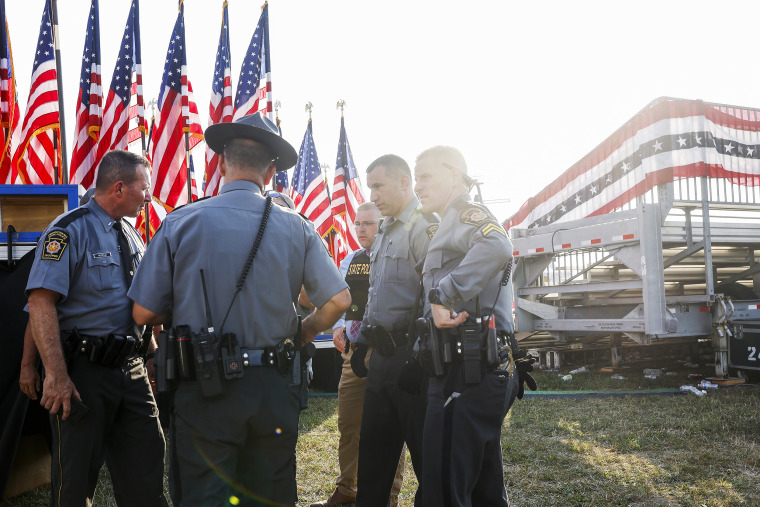‘Gunshots at the Trump rally’: First audio of 911 calls from Trump assassination attempt

The first call came in at 6:12 p.m.
“Gunshots at the Trump rally,” a woman’s voice exclaims. “Gunshots —”
“Yep,” the emergency dispatcher interrupted. “The police are on the way there.”
“Better get over here quick!”
Following that 15-second phone call, a barrage of others flooded into Butler County’s 911 communications center over the next 35 minutes, some capturing screams of panic in the background amid the chaos surrounding the near-miss assassination attempt on former President Donald Trump at an outdoor campaign rally.
“We’re at the Trump assembly and there’s a guy shooting,” one breathless woman called in, seconds later. “He’s been shooting up the place.”
“The Butler fair, it’s getting shot up!” another female caller reported.
The audio recordings of 15 calls are the first 911 communications to be released publicly since the July 13 assassination attempt at the fairgrounds in Butler County, Pennsylvania.
The recordings — received by local emergency dispatchers shortly after the shooting — were disclosed Wednesday by Butler County as part of a legal settlement with NBC News and two other news organizations. The media outlets sued for the recordings last month after the county initially denied their public records requests for them.
The shooting by 20-year-old Thomas Matthew Crooks of Bethel Park, Pennsylvania killed rallygoer Corey Comperatore, 50, critically injured Jim Copenhaver, 74 and David Dutch, 57, and left the former president’s right ear bloodied before a cadre of Secret Service agents hurried him off stage and away from the scene. After the shots rang out, a Secret Service countersniper quickly shot and killed the gunman.
But exactly how the shooter managed to clamber onto a rooftop with an AR-style assault rifle less than 200 yards from Trump and fire off eight shots at the then-presumptive Republican presidential nominee sparked multiple investigations into the Secret Service and its preparations for the event. It also led to the resignation of Secret Service Director Kimberly Cheatle just 10 days after the incident.
Findings from separate investigations into what went wrong released in different reports this month — including an independent review by a four-member panel of law enforcement officials appointed by President Joe Biden, and an interim report from a bipartisan congressional task force — cited numerous systemic lapses, breakdowns and other failures in the Secret Service’s planning and communications with local law enforcement helping to secure the event.

Secret Service agents later thwarted a second apparent assassination attempt on Trump at his golf course in West Palm Beach, Florida, in September. And this month, Trump returned to the site of the first attempt on his life, holding another rally at the outdoor venue amid heightened security and behind bulletproof glass.
In the aftermath of the Butler rally shooting, local agencies released some police body camera video from the rally, but none of the recordings from 911 calls surrounding the incident had been disclosed before Wednesday.
The 15 recordings, covering a span following the shooting from 6:12 p.m. to 6:47 p.m, captured panicked callers phoning in from the rally and others who weren’t in attendance but had received calls from their loved ones there.
In one of the calls, a dispatcher in neighboring Allegheny County transferred what she described as a woman reporting that her husband had been shot at the rally.
“Paramedics serviced him,” the woman said. “I called Butler Hospital. He’s not there. They told me to call 911.”
In another call about 10 minutes after the shooting, a man calmly asked for a paramedic.
“Some lady has passed out,” he said. “There’s been a shooting.”
After explaining the woman was in “the green section,” the man told the dispatcher: “They just tried to kill President Trump. You might want to make a note of that. Thank you.”
One of the calls came from a man who said he was calling from North Carolina to report that his mother had just phoned him from the rally.
“She called me to say there’s an active shooter on the ground there,” he said.
In another call, transferred to Butler 911 from an unidentified jurisdiction at, a woman with a quavering voice reported that her mother had called her from the rally, saying “a bunch of people are on the ground and she’s like screaming–”
“Yep, the police are there, they’re taking care of the situation,” a dispatcher assured her.
“What am I supposed to do?” she asked.
“The police are taking care of the situation. If she’s able to evacuate the area there, the police are going to start getting people out of there.”
“OK,” she said. “OK. OK.”
Following the shooting, Butler County officials initially denied public records requests from news outlets, citing a provision in the state’s Right To Know Law that generally exempts 911 calls from disclosure. NBC News, Scripps News and The Intercept each sued based on part of the law that gives public agencies discretion to disclose such records when “public interest favoring access outweighs any individual, agency or public interest that may favor restriction of access.”
In the court petition, attorney Joy Ramsingh, who represented NBC News and the other news agencies, stated that “it’s difficult to fathom a case where the public interest in disclosure is more obvious, given the political, historical and national significance of this assassination attempt.”




















